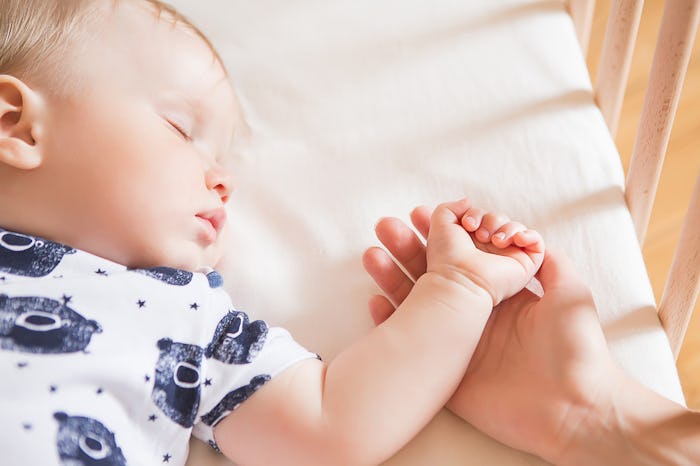Life

Everything You Need To Know About Baby's Sleep After 6 Months
When you have a baby in the house, sleep schedules can become one of the most influential things in your life. If your baby doesn't sleep, the rest of the family probably doesn't either, so making sure your baby is catching enough Zs is extremely important. Beyond your own need for sleep and not wanting to deal with a sleep-deprived, cranky baby, your little one needs sleep for their growth and development, and their schedule may need tweaks as they grow older. If you conquered the newborn sleep schedule, but they've grown out of it, you need to know the best sleep schedule for 6 to 12-month-olds.
As with people at any other age, babies vary. "Every baby is different and so are their sleep patterns and schedules," as Tracy Small, the program manager at the Illinois Birth to Three Institute, part of the Ounce of Prevention Fund, tells Romper by email. "The most important thing is to pay attention to how your baby’s amount of sleep compares with [their] progress through developmental stages. If there may be cause for concern, a doctor can help find solutions that will ensure your child is getting adequate sleep." While the exacting details of your baby's sleep schedule may vary slightly from that of your best friend's baby (or even one of your other babies), there are some general guidelines to consider.
Because babies in this age group need anywhere from 12 to 15 hours each 24-hour period, according to the National Sleep Foundation, and about 10 of those hours at night, you likely need to start your baby's bedtime routine between 7:00 and 7:30 p.m., sleep expert Kim West, also known as The Sleep Lady, tells Romper by email. "Keeping your baby up later usually leads to more night waking and early rising," West says. "Remember that good nap days lead to good nights of sleep. Try to keep an early bedtime and watch your baby's sleepy cues."
A bedtime routine can consist of things like taking a bath, snuggling, changing into pajamas, reading books, singing songs, and turning on a night light or white noise machine (or both). Doing this consistently at the same time each night helps your baby recognize that it's almost time for bed, which can coax them to sleep with less of a hassle. If they're still struggling with falling asleep, whether it's every night or just on certain nights from time to time, soothing sounds may help. "I recommend the Baby Shusher: The Sleep Miracle, a wonderful device with a real human voice that soothes and comforts babies so they can fall asleep easily and comfortably," as sleep expert Charlotte Wenham tells Romper in an email exchange. Soothing music, nature sounds, or, again, a white noise machine may also help.
Naps are an essential part of any 6 to 12-month-old sleep schedule because, as West notes, good naps can lead to better sleep overnight. Make sure daytime sleeping is truly just a nap, however. "If baby sleeps more than three hours at a stretch, consider waking him. Babies should definitely nap during the day, but more than three hours is not a nap," Wenham says. "To wake him gently, try holding him upright or tickling his feet. Once he is awake, sing or talk to him softly so the transition is easy and comfortable."
Fitting in daytime naps can also get tricky, particularly if you have more than one kid or if the family has a busy schedule on a particular day. According to West, once a baby hits about 6 months, it starts to get more difficult for them to just nap anywhere. "The amount of wiggle room you have for naps is definitely based on your child's temperament, but the majority of babies will begin to have a harder time napping outside of their usual environment at this age," West says. Making sleep a priority is important because of how important sleep is for health in general. While skimming time off a nap here and there or even skipping one periodically might not be a huge deal, you definitely don't want to make it a regular habit.
Ultimately, sleep, like healthy eating, play time, hygiene, and more, is an important part of life as a baby. Not only does it provide energy and help you feel rested and restored, it's also vital for growth and mental, social, and emotional development. With a well-rested baby and a well-rested parent, everybody's happy and healthy.